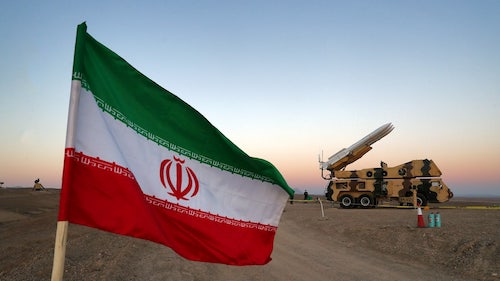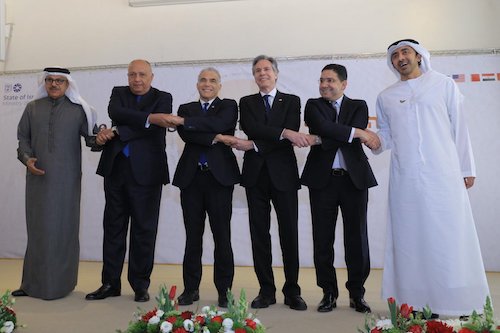|
 |
Biden Administration is Completely Wrong on Iran
|
|
Shoshana Bryen reminds us that nuclear weapons are not the only threat from Iran and that the Biden administration’s policy has been to do exactly the wrong thing on Iran at every turn:
|
|
But Iran, it could be argued, might have been willing to accept delays in [its nuclear] program in exchange for time, space and money to pursue its long-term conventional goals, of which it has many.
…Conventional capabilities and conventional prizes are what Iran covets. Nukes are for later, but progress is essential for the protection of the mullahs. Current administration policy towards Iran pays little heed to the arming and training of terror forces around the region; efforts to control the Persian Gulf and Red Sea outlets to the Indian Ocean; or the goal of pushing the United States out of the region. Money and the veneer of respectability for Tehran will ensure a steady stream of funds, arms and allies in the form of Russia and China.
And in the process, Biden and company are pushing away traditional allies and potential allies, reducing the willingness of countries to work with us in a variety of regions.
All this for a new Iranian signature on a deal that didn’t work the first time.
|
|
International law expert John Yoo writes that it would be a grave mistake for the US to enter into an agreement with Iran, with no way to enforce the terms of the deal:
|
|
The difficulty for nations in making treaties is trust: No supranational government exists to force nations to keep their promises. Especially when their security and core interests are at stake, nations have strong interests to cheat. Democracies should place little trust in autocracies, which won’t hesitate to break their promises to other nations just as they so easily break them to their own citizens. President Biden ignores these lessons in his rush to seek diplomatic victory by reviving a nuclear deal with Iran, which will only leave the mullahs in Tehran richer, more powerful, and closer to possessing nuclear weapons.
|
|
One more thing to remember: according to a new report from the Pentagon, roughly one in every six American combat fatalities in Iraq were attributable to Iran. At least 603 US personnel deaths in Iraq were the result of Iran-backed militants.
|
|
|
|
|
|
 |
|
We could be days away from a new, even more dangerous, nuclear deal with Iran. Until Iran takes meaningful steps to end its pursuit of nuclear weapons capability, we must maintain and expand strong sanctions on the regime in Tehran and on states and entities that do business with it. President Trump's "maximum pressure" sanctions on Iran were working and must continue.
Tell your Senators and Congressman: Please don't let this existential enemy of the US and our ally Israel achieve its nuclear weapons goals. Oppose the Biden administration’s bad nuclear deal with Iran.
Please make your voice heard NOW!
|
|
TAKE ACTION >>
|
|
|
|
|
|
 |
|
The foreign ministers at the Negev Summit (l-r): Abdullatif bin Rashid al-Zayani (Bahrain), Sameh Shoukri (Egypt), Yair Lapid (Israel), Antony Blinken (US Secretary of State), Nasser Bourita (Morocco), and Abdullah bin Zayed al-Nahyan (UAE). (Source: Twitter)
|
|
Light and Darkness in Israel
|
|
In the past 2 weeks, Israelis have seen the bright future and the dark past standing side-by-side. On March 21, Israeli Prime Minister Naftali Bennett, Egyptian President Abdel-Fattah el-Sissi, and UAE Crown Prince Mohammad bin Zayed held the first-ever trilateral summit meeting of their countries in Sharm el-Sheikh. The three leaders discussed Iran and the Biden administration’s efforts to return to the failed 2015 Iran nuclear deal.
This past Sunday, the foreign ministers of Israel, Egypt, the UAE, Bahrain, and Morocco gathered in southern Israel for what was dubbed the “Negev Summit,” another terrific achievement for the Abraham Accords, which President Donald Trump and his team brought to fruition in 2020. The summit was marked by warmth and positive movement toward more cooperation and interaction between Israel and these Arab states. The Times of Israel reports:
|
|
At their historic summit in the Israeli Negev town of Sde Boker on Monday, the top diplomats of Israel, the US and four Arab nations announced that the conference would be the first iteration of a permanent regional forum, as they reaffirmed the importance of growing ties between Israel and the broader Middle East.
|
|
Tragically, in the past two weeks Israel has also experienced three terrorist attacks, in which 11 people were murdered. For many, the attacks brought back the trauma of the intifadas, a dark and perilous time that deeply affected the Israeli people. One of the attacks, in which two Border Police officers were killed, happened the day the Negev Summit began. The Arab foreign ministers all condemned the attack. The Daily Wire reports:
|
|
Bahraini Foreign Minister Abdullatif bin Rashid Al Zayani condemned the terror attack, adding that the summit was “an important and timely meeting,” Morocco’s Foreign Minister Nasser Bourita echoed, “Our presence today is the best response” to terror attacks.
|
|
US Secretary of State Antony Blinken joined the Negev Summit. His remarks were another throwback to the past, with his focus on the Palestinian issue rather than the threat from Iran and its proxies. Blinken said at the conclusion of the summit that “these regional peace agreements are not a substitute for progress between Palestinians and Israelis… This is a conversation we’ll carry forward so that we can work toward our goal of Palestinians and Israelis enjoying equal measures of freedom, security, opportunity, and dignity, and create the conditions for a negotiated two-state solution.”
Jonathan Tobin sharply criticized Blinken’s statement:
|
|
As Blinken made clear in his remarks in a joint press conference with Israeli Prime Minister Naftali Bennett, Washington remains wedded to the assumption that peace in the region hinges on empowering the Palestinians. By downplaying America’s impending appeasement of Iran and trying to shift the conversation back onto criticism of Israeli policies, Blinken was out of tune with the priorities of the other summit attendees and the reality of the region.
|
|
Jordan did not participate in the summit and in fact, Jordan’s King Abdullah II made a rare visit to Ramallah on Monday to show solidarity with the Palestinians and discuss ways to prevent violence next month, when Passover, Easter, and Ramadan will all take place.
Israeli President Isaac Herzog and Defense Minister Benny Gantz also met with King Abdullah this week in order to strengthen Israeli-Jordanian ties and to preserve stability and peace during the holiday season.
|
|
Further reading:
|
|
|
|
|
|
|
|
|
Biden risking new wars with Iran ‘diplomacy’ — and our Middle East allies know it
Michael Rubin and Jonathan Schanzer write that Russia, Iran, and other bad actors in the world understand that the Biden administration has no appetite for confrontation. So they will step up their malign activities while the security of the US and our allies suffers.
|
|
The Arab world is leading the fight against antisemitism
According to Sarah R. Cohen, the chief of staff to Rabbi Yehuda Sarna, Chief Rabbi of the Jewish Council of the Emirates, a new narrative of tolerance and mutual understanding is being written in the Arab world. Efforts in Morocco, the UAE and elsewhere are focused on countering violent extremism and teaching tolerance. She writes, “If we are to defeat antisemitism, governments and civil society must commit to building people-to-people connections on a broad scale. The Arab world is leading the way.”
|
|
|
|
|
AZ: Senate Candidates Forum
Live event in Scottsdale.
|
|
RSVP >>
|
|
|
|
|
|
PA: Meet & Greet with Rep. Brian Fitzpatrick
Join RJC members and the RJC PAC for this special event.
|
|
RSVP >>
|
|
|
|
|
|
DC: National Leadership Meeting
Hear from Sen. Tim Scott, House GOP Whip Steve Scalise, and more!
|
|
Get Details >>
|
|
|
|
|
|
|
RJC staff have returned to their offices for in-person work. Contact information for our offices can be found on our web site. Please visit us online for the latest RJC news, to see details of upcoming events, and to donate to the RJC. Read past editions of this newsletter here.
|
|
|
|
|
|
|
|
Republican Jewish Coalition
50 F Street, N.W., Suite 100 | Washington, DC 20001
202.638.6688 | [email protected]
|
|
|